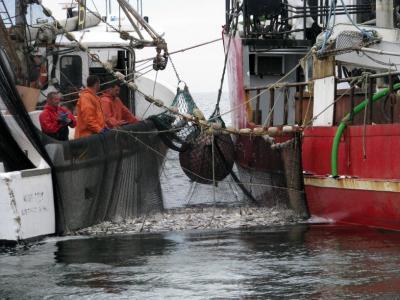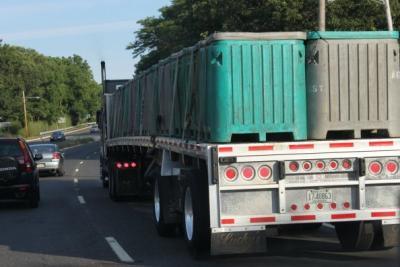Since early spring, Monday thru Friday, from sun up to sun down the inshore bait purse seine fleet has been busy scooping up the schools of adult menhaden (bunker) that have gathered enmass along our Northern NJ shorelines. During my fishing charter trips between Sandy Hook and Manasquan Inlet, I see the bunker boats, complete with spotter planes zoning in on the giant schools of menhaden and relentlessly filling boats up untill they can barely sit vertical in the water. The boats are easy to identify since all of the bunker bait boats are required to display a big yellow "B" on the side and must not get closer than .06 nm off the beach and not enter federal waters at the 3 mile mark.
By New Jersey state law, the bait boat sector's catch can ONLY be used for supplying the bait industry, which is typically bait & tackle shops, lobster and crab fisherman etc. The catch from these "B" boats cannot be sold for fish meal reduction.
Recently, our local bait fleets have been joined by some new boats. Some of these vessels are from as far away as Gloucester, Massachusetts and from Cape May. Interestingly enough, I found these boats are docked each night right next to the local bait boats at the fish coop right in Point Pleasant.
I am thinking that in light of the poor economy, the coop decided that having more and bigger boats (The Red bait "carrier" type vesselin the photo can hold 300,000+ pounds of bunker, while the smaller white boat can hold 45,000 pounds) was a good thing, since they all share in the reward.
Why would a commercial fishing boat from Gloucester come to New Jersey waters? One would think that compared to Jersey waters, the New England waters would be teeming with fish. Could it be that there are no more fish left to catch back home?These guys wereallpart of the now defunct herring and pogie (new england term for bunker aka menhaden)purse seining fleet up north. There is no more herring fishing in Gloucester, Mass and there is a statewide moratorium there.
The waters have been completely overfished and depleted. When I was shooting these pictures and video, the Captain of the Taylor Creek vessel called me over to talk. His attitude was much different than I expected, after reading some of the negative reports from fisherman on web based message boards. He was cordial and friendly and even invited me on board to watch them make a set, & offered me some bait.
He was confused as to why I was so concerned about all of the "little fish" he was catching, and why I wasn't more focused on the oil spill in the gulf and how the oil was probably going to come north to our waters. He was intent on letting me know that he wasn't killing bass and that he was just trying to make a living. He said that his "little fish" were NOT being ground up and was headed to New England for use in lobstah pots. While he was being very friendly, in the background, I was amused that the skipper aboard the sister vessel was flipping me off, double, I might add.
Many Jersey striper fisherman have reached the boiling point with the taking of all these menhaden and are wondering how the state of NJ and the government can allow this to happen. It is taken as a clear assault on the Striper fishing, and is left un monitored, with little or no enforcement. Additionally there is another factor that is really pissing all of us off, and that is the potential striped bass bycatch factor from these boats. While I have not personally been able to document any floating dead bass, other anglers have reportedseeing many dead bass in the wakes of these boats after the net set is removed,
The bunker boats are not permitted to have any other type of fish on board when they return to the dock, A big bass would really stand out in a pile of bunkers and it is my guess that to avoid a fine they would gaff, discard and "sink" any bass out at sea before coming into port.
After the boats pull up the nets, a slick of dead bunkers and related scum and debris isleft for the gulls to clean up.
It's very unfortunate that at a time when Striper populations are on the decline, that we have this additional pressure on the large breeder bass. It's bad enough that so many recreational anglers choose to kill fish over twenty pounds.
Ecologically speaking, the practice of purse seining is a relatively "decent" way, ascompared to other commercial fishing methods, to catch fish that congregate in large schools. These guys can specifically target the desired fish without a lot of "bycatch", but it does occur and unfortunately has the potential to killbass if they dont head for the depths before the net is drawn tight. It's rare to be able to catch and release anything that gets caught in one of these nets, since they are usually suffocated under the masses.
Yes, these highly efficient boats and spotter planeshave overfished and stripped the waters of New England clean and it's our turn now, and nobody in charge seems to care. They are going to stay here until they overfish New Jersey's menhaden as well, since there is no limit on the amount of menhaden that you can catch in NJ. Chances are pretty good that Gulf oil spill will shift even more vessels north into NJ waters and they can join in on the gold rush.
Each evening and well into the night, on Channel Drive in Point Pleasant, the land based half of this operation takes over. A procession of insulated tractor trailer and flatbed trucks line up under the chutes and fill up hundreds of insulated containers with a bunker and ice mixture. They drive out of New Jersey, loaded up with our fish and head back to where they come from. Truck doors and license plates on the trailers read from Maine, Mass, Rhode Island, North Carolina, Florida all the way to Texas.
While I have nothing against the local bait boat fleets fishing and making a living staying within the guidelines set forth for the bait related industry., there needs to be limits set and changes in the land based distribution of the catch. The fish dealers are raking in the profits from this unregulated, free fall slaughter at the expense of the ecosystem and the citizens of the state of NJ.
The recreational fishing businesses sector, related marine trades and other entities along the Jersey shore are going to ultimately take the hit. Make no mistake about it, this commercial fisherytakes more single fish out of the water than any other on the East Coast and it's is all about money. These guys will be the first to scream "where did all of our fish go" when its all over.
When the bunker are gone, the fishing will go with it, not to mention everything else in the ecosystem that rely on the bunker for survival.
I have seen the afformentioned Captain atop a bunker transport truck, pouring his cold cash,oops, I mean catch, into tank trucksdestined for New England, so I have reason to believe that what he told mewas the truth. However, when those specific trucks are full and there are still fish left over, where do they go?
Coast Guard patrol vessel shows up, shoots a video, radios HQand is told everything is legal and pulls away
In my opinion the inshore operation is where that real issue lies, and the fish dealers are really the key to this entire issue.Without them the bait boatscould not maximize the profit from the catch. The dealers make the phone calls and schedule all the trucks and when they run out of bait people to sell to, the excess has to go some where and this is where it could get messy. It's easy to work around the current system, especially when the economy and state cutbacks have taken its toll on the people that would normally regulate the resource.
Sure, the bait fleet gets more money per pound for fish destined for lobster traps, but bunker is highly perishable and excess days catch is certainly never wasted. It doesn't take much of an imagination to know where the excess is winding up. I will leave it up to you to decide if this is occurring, but in my opinion theres way too many fish coming out of the water and the need for for bait cannot keep up with the rate of supply.The numbers just don't add up. With the demand for fish meal and oil at an all time high, a couple of phone calls, the wholesale fish dealers can line up even more trucks up and drive them right into the Omega Protien Plant in Reedville Va.
Omegais the only company left that specializes in menhaden fish meal reduction and fish oil. Omega is only required to report fish that are brought in off the water by vessels into the dock at the plant. Over the road deliveries by truck don't get added into the equation and if they did, quotas could be re-adjusted to protect the resource.
A change in the regulations is needed to make sure that everybody plays by the rules, there should be a special provison that states that Omega Protein would eliminate it's bait division and not be allowed to sell fish for crab bait and limit them to fish meal reduction only. This would enable enforcement of the law and eliminate any possibility that fish that are caught legally for the bait industry cannot wind up as fish meal or fish oil.
The menhadenplay a pivotal role in the aquatic food web and provide nourishment for a diverse group of marine creatures, seals, osprey, striped bass,whales,dolphins, tuna, etc. Removing millions of metric tons of menhaden unregulated from the ecosystem is a sure fire way to cause a collapse.
As a fishing guide writing this piece, you knew there had to be a direct link to fishing.
Putting the health of the ecosystem aside and focusing on the economics of it all, I have to mention that the annual striped bass migration coming up from points south sticks to the migrating bunker schools like glue. If you have been reading the newspapers, fishing magazines and watching the internet over the past 90 days you have seen that Jersey bass fisherman have had an amazingly successful spring striper fishery. Countless 30,40,50 and even 60 pound stripers have been caught. Old timers are saying they have never ever seen this many big fish stay in our area for so long.
This healthy, bunker fed Striped bass was caught by Reel Therapy client following bunker schools. (Fish Released)
Since early May, party boats andindependent charter boats have been booked up and producing limits (and killing) trophy sized cow bass like never before.There is a direct correlation between the amount of menhaden in the water, the health of all of the gamefish species, the quality of fishing and the success of local fishing and related businesses.
As if this wasn't enough, as more and more menhaden are removed from the ecosystem, more undernourished and sick (Mycobacteriosis) affected striped bass areshowing up at an alarming ratein more than 60% of the bass swimming the waters of the Chesapeake bay, the primary breeding place of this valuable gamefish.
The Government of the State of NJ has turned a
blind eye to this vital sector.
If Governor Christie truly cared aboutthe economic welfare of Jersey taxpayers and businesses of this state, he would shut down the interstate transport of menhaden and protect the local communities that depend upon good fishing to survive. Keeping the local fishing good keeps businesses thriving, and keeps the money in our local economy.
The recreational sport offishing for Striped bass fishery alone is worth its weight in gold. Read the Southwick study(http://www.stripersforever.org/info/southwickstudy) to gain an understand of just how valuable a living striped bass is to the economy. The study shows that commercial fisherman would have to sell striped bass at 20 times its current price to equal the value of the recreational sectors economic weight.
Recently a bill was introduced (A2304/S1140) that would prevent any new and out of state commercial fishing vessels from entering the bunker bait fishery. While this is an important step in the process, I feel that more must be done since all of the vessels that are fishing now would basically be "grandfathered" in, and the madness will continue just like it does right now. I am proposing that an additional "Keep the bait in the state" bill is needed that would prevent any menhaden that are caught in state waters from being "exported" to other states. Realistic and reasonable catch limits need to be re established to keep these businesses alive, while at the same time conserving the resource for nature to thrive. We need to protect our state resources, our ecosystem, our water quality and insure that New Jersey waters are not exploited to the point that other regions have already experienced.
Current menhaden management stock assessments that decisions are based upon need a completeoverhaul. Special interest groups have lobbied hard to insure that nothing happens to fish meal and fish oil business, while the rest of us take it on the chin.The time for sitting on the sidelines is over. This must be recognized and changed by the ASMFC before it is too late. Menhaden stocks are way down and have been steadily declining over the past decade. At the current, highly efficient rate of unregulated removal the menhaden stocks could collapse and that will trigger a catastrophicevent within the marine food web that nobody wants to witness.




